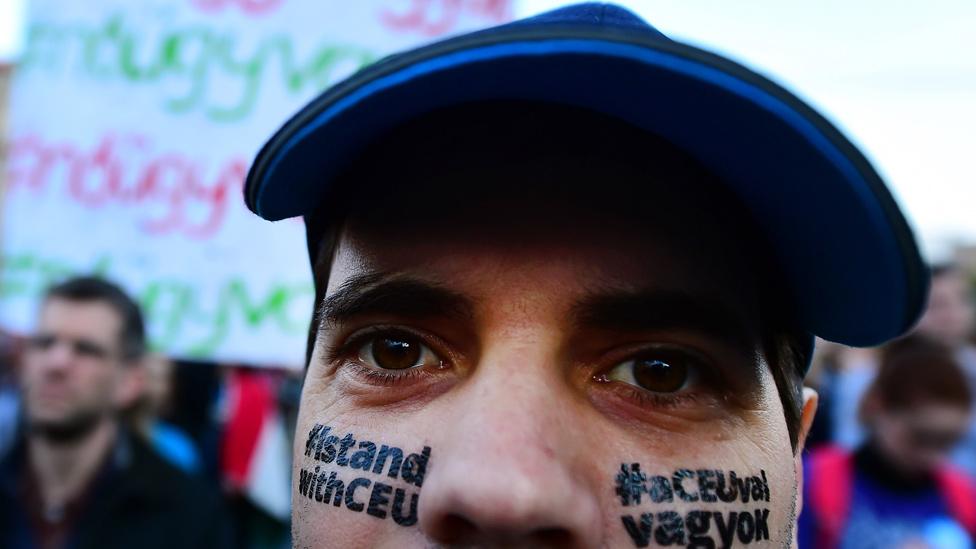Hungary education law: EU to take legal action amid university row
- Published

Rallies have been staged across the world in solidarity with the Central European University
The EU is taking legal action against Hungary over an education law that could close a prestigious university founded by billionaire George Soros.
EU Commission Vice-President Valdis Dombrovskis said the law was not compatible with academic freedoms.
Prime Minister Viktor Orban addressed the European parliament in response, condemning Mr Soros as an "American financial speculator".
The law has led to some of the biggest protests since Mr Orban came to power.
Thousands have rallied in a number of demonstrations since it was pushed through parliament earlier this month.
Mr Orban continued his attack on Mr Soros by saying the Hungarian-born investor had "destroyed the lives of millions".
The university responded to the EU's decision by saying it "confirms CEU's conviction that this legislation is discriminatory and runs counter to European values".
The latest feud between Hungary and the EU marks a new low in the tense relations between Brussels and Budapest over the government's rights record.
His government's Higher Education Act means the Central European University (CEU) in Budapest would be unable to award diplomas because it is registered in the US.
Based on an "in depth assessment", the European Commission found the law was not compatible with the EU Charter of Fundamental Rights on the following:
freedom to provide services
freedom of establishment
right of academic freedom
right to education
freedom to conduct a business
The EU is sending a letter of formal notice to the Hungarian government.
"There is time for the Hungarian authorities to react and then following reactions, the commission will decide on the next steps," Mr Dombrovskis said.
Once the commission receives Hungary's response, it can then decide whether to refer them to the European Court of Justice.
The CEU is considered a beacon of liberal values and is ranked among the top 200 universities in the world in eight disciplines.
Hungary has also been criticised for its treatment of asylum seekers. An outcry arose last month when the authorities approved a law to detain them in secured shipping containers.
There is also concern over a proposal to tighten rules on NGOs, requiring them to register with the authorities if they receive an annual foreign income of at least 7.2m forint (£19,240; $24,700).
On Saturday, the European Peoples Party bloc in the European Parliament, to which Mr Orban's Fidesz party belongs, will decide whether or not to expel Fidesz.
Mr Orban said his government remained committed to the EU but wanted far-reaching reforms.
UPDATE 27 April: Now includes CEU reaction to EU decision.

The Central European University

Founded to "resuscitate and revive intellectual freedom" in parts of Europe that had endured the "horrific ideologies" of communism and fascism
Occupies a building that began as an aristocrat's palace before becoming state-owned offices for a planned socialist economy
Has 1,440 students - 335 from Hungary and the rest from 107 other countries
Presents itself as a champion of free speech, with links to universities in Russia, Kyrgyzstan, Georgia and Kazakhstan

- Published22 April 2017

- Published12 April 2017

- Published10 April 2017
